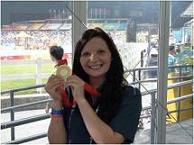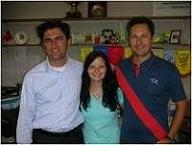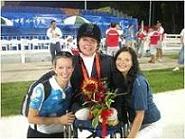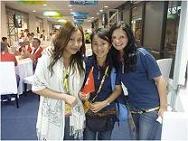Carina Mayer at the Hong Kong Equestrian Federation
Olympic & Paralympic Equestrian Events 2008
Contact details:
Hong Kong Equestrian Federation (HKEF)
c/o The Hong Kong Jockey Club
Shatin Racecourse
6/F Central Complex
Shatin, New Territories
Hong Kong
Introduction
Looking back on the six months that I spent in Hong Kong for my internship, working at the Hong Kong Equestrian Federation (HKEF), brings back lots of amazing memories of a wonderful time. I did typical things that probably most tourists would do if they come to Hong Kong - such as karaoke, sightseeing trips, watching horse racing or enjoying the delicious "real" Chinese food with chopsticks - just to mention a few of them. But what makes it 100% worth to spend a practical training semester abroad are the special experiences you can gain by working in a foreign country which gives you the opportunity to be like "one of them". This offers totally different insights and experiences that others who never studied, worked or lived abroad probably won’t get. In the following report I would like to point out in which way I gained these impressive experiences within my internship, both personally and regarding my future profession as a sports manager. Furthermore I will try to give some tips and advice (pre-departure / post-arrival / post-return) to other students who are planning to go to Hong Kong – which is in fact the best decision you can make ;-).
A. Pre-Departure: Organizing the trip - lots of things need to be done
Pre-departure tips:
- Collect the statement of your bank account and be happy about the big bucks that were transferred from your scholarship donor. Well, if you didn’t apply for a scholarship you definitely missed a great opportunity. To make sure that you don’t miss this chance, visit Sprachen/Internationales at RAC as soon as possible and ask for your scholarship opportunities. I myself can totally recommend applying for an InWEnt scholarship!
- Make a request for a credit card. I would recommend a Visa card of comdirect because it is accepted almost everywhere in case you need to pay substantial amounts of money (e.g. for a flight, accommodation, in a restaurant, etc) and it additionally allows you to draw money from cash machines worldwide without paying extra money for
- Collect information about appropriate insurances (foreign health care, accident) – in this matter I can recommend the ADAC.
- Buy a small dictionary "Deutsch-Kantonesisch; Kantonesisch-Deutsch".
In Hong Kong most people speak Cantonese and NOT Mandarin which makes it quite useless to use a "normal" Chinese dictionary which would be in Mandarin.
- Make some passport photos as long as you are in Germany because you will probably need them in Hong Kong - for example to apply for a Visa to enter Mainland China. If you intend to apply for such a Visa this can be done at each "China Travel Service" Branch in Hong Kong.
- Check out the internet for cheap call rates from Germany to Hong Kong. Of course you can also use Skype but with these special call rates your family and friends can also make normal phone calls to HK for less than one Cent per minute! My family always used the prefix 01042 for 0,99 Cent/Minute. These codes change from time to time so better check
www.billiger-telefonieren.de
B. Post-arrival: The adventurous and fantastic journey has begun!
Intercultural differences / daily life
Upon my arrival I felt well prepared for this internship after a long struggle for such a placement and the efforts that I put in on my way to get there. Full of motivation and looking forward to the upcoming time I never felt scared about any intercultural differences that may cause a problem for me as I just wanted to get to know the Hong Kong way of life by living it. The intercultural training that I had attended in Germany in order to prepare myself for this trip was a perfect basic which I would recommend to everyone who is planning to go abroad, as it makes it much easier to understand the source of intercultural differences. Even after having spent six months in Hong Kong there are no negative intercultural differences that I could state whereas I can point out quite many positive ones. Already right at the beginning of my internship I realized that people spend a lot of their free time together with eating, which is a great way to socialize with others and made it much easier for me to become a real part of the office staff. It is a totally uncomplicated way to have nice small talks during lunch breaks or after work and therefore getting to know each other better within quite a short time. In general I always had the feeling that everything is in its order in Hong Kong, people are queuing up wherever they have to wait for something and the cleanliness all around is amazing regarding to the mass of people that are passing through MTRs, busses, shopping malls, streets and even public toilets every day. Moreover I was deeply impressed how safe this city is or at least how safe I felt at all times no matter where, at what time, in companion with somebody or alone I walked in the streets.
In my point of view life is very convenient for foreigners in Hong Kong as many people speak English and the city (as for example public transport, shopping malls, restaurants) shows the English characters besides the Chinese ones which cannot be taken for granted in other countries such as Mainland China itself. Nevertheless Hong Kong doesn’t loose its Chinese identity as there are still many very local parts spread all over the city which makes living in Hong Kong very interesting with all the contrasts it has to offer.
Post-arrival tips:
- Buy a cheap SIM-card for your mobile phone in one of the small "7eleven" shops that you can find almost everywhere in HK. You can also buy the recharge code for the card in these shops. Here I would like to mention that telephoning and sending text messages is very cheap in HK, of course only as long as it is within HK.
- Buy an "Octopus Card" as soon as possible at one of the MTR stations or in a 7eleven shop (MTR=Mass Transit; similar to a German "Straßenbahn" or "U-Bahn"). It is actually almost impossible to live in HK without an Octopus Card because you need it to pay for any kind of transportation (MTR, bus, ferry) and you can even use it to pay in the supermarkets, 7eleven shops and many many more occasions. This is definitely a "Must-have" in HK!!!
- Ask your Chinese colleagues to translate the address of the office and your living-apartment from English into Chinese characters and to write it down for you on a piece of paper. Believe me that this saves a lot of nerves and time if you lost your way in HK J.
- Buy a city map of HK with Chinese and English characters. This is quite useful if you lost your way and/or want to go somewhere by taxi and the taxi driver doesn’t speak any English – so you can just show him the Chinese name of the street where you want to go.
- Always take a map of all MTR stations with you. The MTR is the most convenient and essential transport of people in HK.
- It is true that electronic stuff is cheaper in Asia than in Europe but if you want to buy a camera, mobile phone or something else with high quality for less money instead of poor quality for too much money you should always ask some of your Chinese friends or office colleagues to go shopping with you. They know which shops are serious and where you can make a true snip and save money.
- Don’t miss to try as much typical Chinese/Asian food as possible, I can especially recommend Dim Sum, Peking Duck and Sushi. It’s really VERY tasty!
Internship job duties
From the first day onwards I felt as a normal member of the office staff rather than an intern and was therefore assigned my own job duties which included several areas of work. At the time of my arrival at the end of March the preparation for the 2008 Beijing Olympic Games Torch Relay with its own part at Shatin Racecourse in Hong Kong was in full progress. A carriage driver from Germany had been chosen for being one participant of the Torch Relay and therefore three horses, a carriage, the carriage driver and one groom for the horses were brought over from Germany to Hong Kong. It was my task throughout the whole month of April until the day of the Torch Relay on the 2nd of May to act as a coordinator for the Torch Relay part of the carriage driver, accompanying him to all training sessions, rehearsals, meetings or other matters such as interviews and thus ensured his smooth and trouble-free preparation for the event day. Being with the carriage driver and his groom during their preparation process and on the event day itself gave me the opportunity right at the beginning of my internship to get to know many different people who are involved in equestrian matters outside the office and to get an insight into the management of such a historical event.
Additionally there was a need to replace the "administrative secretary" of the federation, who had just left the job. So I was immediately made responsible for general administrative work in the secretariat of HKEF which included a wide range of duties and allowed me a detailed insight into the daily business of an equestrian federation. It became daily routine to check and process incoming emails as well as phone calls for HKEF and handling general enquiries of members. As a few HK riders are based in Europe in order to train under top class conditions and compete at top class shows I was in close contact with them as well as international show organizers in order to coordinate the riders’ entries for shows all over Europe.
After four Hong Kong riders had qualified for the 2008 Olympic Equestrian Event in Hong Kong, my job duties regarding the administrative preparation of the Olympic team took up more and more time and claimed priority not only in mine but in everyone’s daily office work. The handling of the Hong Kong Olympic Teams’ accreditation had been my first "Olympic task" right upon my arrival and has been a continuing responsibility until each team member held his accreditation in hands at the Olympic Games five months later. It was my responsibility to apply for accreditations for the team officials, each potential Olympic rider as well as their respective groom and the horse owners of the potential Olympic horses. I furthermore handled the entries of the Hong Kong riders for the Olympic Equestrian Events, ordered the Olympic team dress and ensured that important documents such as medical reports and whereabouts forms (for doping testing reasons) are correctly completed by the athletes and handed in to the Sports Federation & Olympic Committee of Hong Kong (SF&OC) in time. After attending an anti-doping seminar organized by SF&OC I created a summary of the IOC/FEI/WADA anti-doping guidelines for athletes and horses and created some more team information regarding quarantine arrangements prior to the horses’ flights from Europe to Hong Kong as well as a summing up guide with all relevant details concerning the horse flights, accreditation, arrival in Hong Kong, accommodation in the Olympic Village/Grooms Village/Media Hotel, the Olympic venue itself and the transport arrangements for Olympic teams. At an earlier stage I had already been in contact with the people in charge of the Olympic Village/Grooms Village/Media hotel and SF&OC in order to prepare an accommodation agreement, allowing a smooth arrival and departure procedure for athletes, team officials and grooms of the Hong Kong Olympic Equestrian Team. As already mentioned earlier in this report some Hong Kong riders are based in Europe and therefore the horses with their feed and equipment had to be shipped over to Hong Kong. In this context I was in close contact with Schenker Logistics to compile all necessary information for the import of horse feed and equipment into Hong Kong and to coordinate the loading of the container as well as its arrival at the Olympic Venue in Hong Kong.
During Olympic Games time I had the great chance to be the assistant of the Deputy Chef de Mission and Equestrian Team leader of the Hong Kong team, Mr Sacha Eckjans, supporting him whenever problems occurred or anything else concerning the team required a fast acting assistance. Furthermore I was working in the hospitality tent on the Olympic venue which was called "International Federations Tent (IFT)" and only had limited access for Equestrian team members and their families/friends. For the Olympic Games the priority of my job duties was explicit on the Hong Kong Equestrian Team whereas the focus during the Paralympic Games was on my work in the IFT. Being part of both events with full accreditation and therefore access to every place on the competition venue has been an amazing experience that offered me an incredibly close and detailed insight into the organizational structures and procedures of such a mega event, including sports-, event-, hospitality- and team-management.
C. Post-return: Being proud of unique experiences and memories
To sum up I can truly say that each day of my internship at HKEF has been unique and unforgettable and I definitely learned and developed from the very first day to the last one because there were so many interesting and challenging internship duties, so many new things to explore and see in this country and so many nice people who became very good friends of mine. Beside the enormous asset for my sports management skills, the experience that I gained within these six months lead to a significant further development of my personality. Getting to know the Hong Kong way of life, spending time with people of many different nationalities and not at least to stand on my own feet and shift for myself in a foreign country had many positive aspects regarding my self-reliance and gave me the chance to look at things from different points of views. Expressions such as "once-in-a-lifetime experience", "lucky intern" or "the time of my life" may probably describe best my impression of this internship and the time that I spent in Hong Kong. Finally I would like to thank the office staff of Languages/International Affairs at the RheinAhrCampus in Remagen for the professional preparation, moreover of course a big thanks to InWEnt whose financial support offered me the opportunity to spend six months at HKEF and a very special thanks to Soenke Lauterbach, Secretary of HKEF, whose trust in my abilities made this unforgettable experience possible!
- Try to stay in contact with the friends you made overseas! Online platforms such as facebook, msn, Skype ect. are very easy ways to do so.
If you have any further questions you are most welcome to contact me by email!
Carina Mayer















